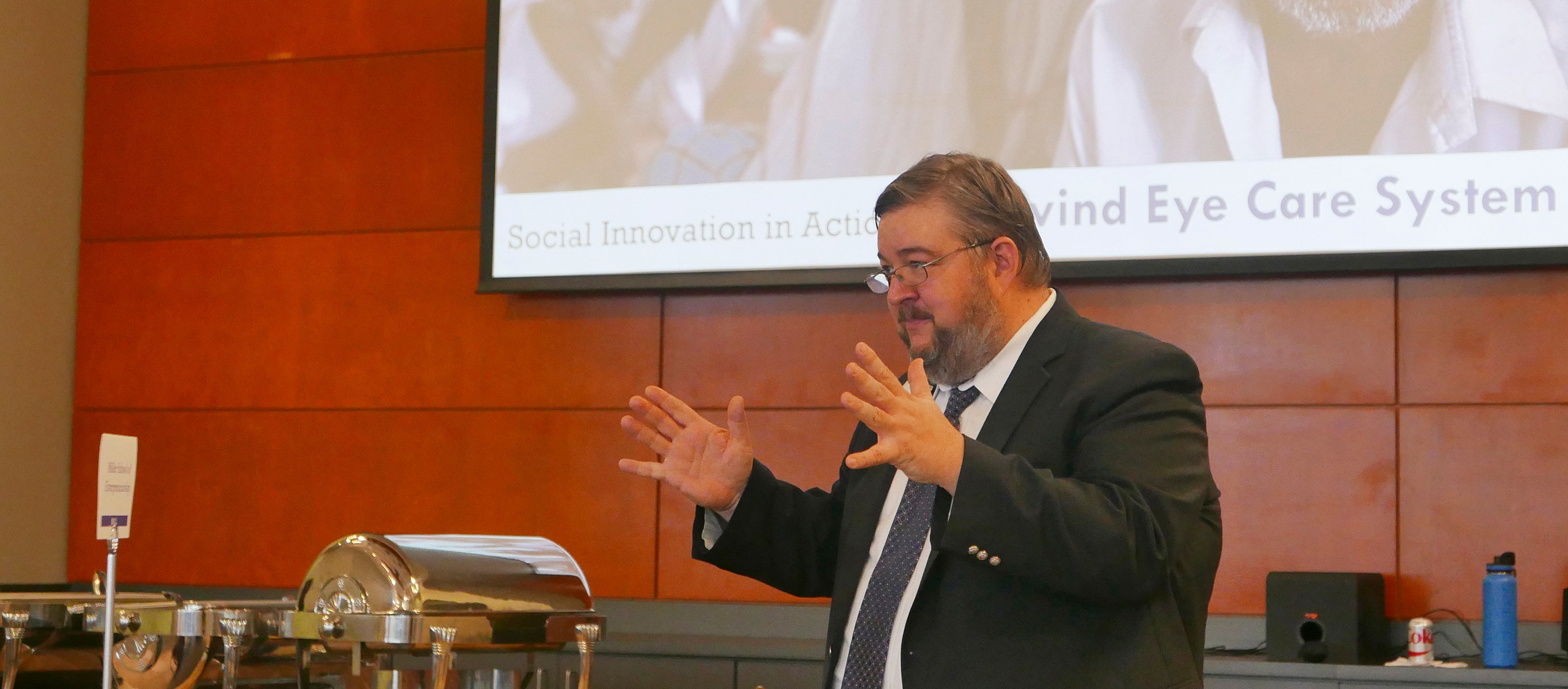Symposium builds connections
Nearly 80 East Carolina University faculty members filled Harvey Hall at the Murphy Center on Tuesday for the inaugural Innovation, Entrepreneurship and Engagement Symposium.
The symposium, hosted by ECU’s Economic Development and Engagement Council, brought together faculty members from across academic disciplines to showcase existing innovation, entrepreneurship and engagement opportunities offered by the university.

Matthew Nash gives a keynote address at East Carolina University’s inaugural Innovation, Entrepreneurship and Engagement Symposium on Tuesday. The symposium introduced faculty members to innovation, entrepreneurship and engagement services provided by the university. (Photos by Matt Smith)
The event was highlighted by a keynote speech from Matthew Nash, managing director for social entrepreneurship at Duke University’s Innovation and Entrepreneurship Initiative. Faculty members also participated in roundtable discussions with leaders from ECU services including I-Corps, innovation spaces, community engagement, the Miller School of Entrepreneurship, crowd funding, the Research and Innovation Campus, the School of Dental Medicine’s community service learning centers, virtual technologies, the Center for STEM Education, the North Carolina Agromedicine Institute, and the Innovation, Entrepreneurship and Engagement Living and Learning Community.
Innovation, entrepreneurship and engaged research activities are enterprises that seek to build, improve, create or affect issues in a community. These activities could include creating a new product that serves a community need, opening a new business or applying academic knowledge to community-based issues with partners from inside and outside academia.
“When you’re trying to build a foundation for conducting innovative and engaged work, you have to think about how to fit the concept of innovation, entrepreneurship and engagement into faculty members’ productivity,” said Sharon Paynter, assistant vice chancellor for community engagement and research. “Today’s event was a way to show faculty members how they can connect to offices and programs that focus on IEE activities.”

Jennifer Watson discusses crowd funding opportunities to a group of ECU faculty members at ECU’s inaugural Innovation, Entrepreneurship and Engagement Symposium.
Paynter said that the symposium also offered faculty members a chance to learn about IEE services to bring back to their students.
Department of Interior Design and Merchandising teaching instructor Tiffany Blanchflower agreed, saying that the event gave her a chance to learn how to connect her students with local community partners.
“Community engagement is the future and we need to embrace that,” Blanchflower said. “If we’re (faculty) only doing research for academia, it’s not going to impact society or our communities. The point of research is to solve problems. By conducting engaged research and by introducing students to engaged research, we’re better preparing students for what their future is going to look like outside of the classroom.”
In his speech, Nash touched on using innovation and entrepreneurship to impact social change. He said by asking students not what they will be, but what problem they are trying to solve, it changes the mindset of how students tackle regional disparities.
“We’re looking for new and improved ways to achieve impact,” Nash said. “We can no longer just imagine what the solutions are and hope that things will work out. We have to work with communities, define their needs with their support and create solutions.”
ECU offers a variety of IEE programs for faculty and students, including the Engagement and Outreach Scholars Academy, the State Employees Credit Union Public Fellows Internship program, and the Community-University Partners Academy. For more information on innovation, entrepreneurship and engagement opportunities, visit www.ecu.edu/cs-admin/communityengagement/index.cfm.
-by Matt Smith, University Communications